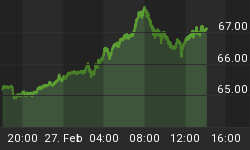
My opinion published 12 months ago, in July 2010 (lone wolf amongst all analysts), as the S&P 500 Index was falling, and trading near the region of 1010.00, was as follows;
"If the Index held at or above our proprietary support zone (1000.00- 950.00 region), it would eventually trade to a new historical high within 12 - 18 months (July- December 2011 timeframe)".
Let's take a closer look how we arrived at this conclusion:
Once the market peaked at 1217.00 in April 2010, and began to correct lower, there was an uprising of opinions as to a "W" recovery (Index possibly trading back toward the March 2009 lows at the 700.00 - 666.00 region). Subsequently, the market corrected down to 1006.50 by July 2010 (12 weeks later). The dip to 1006.50 was directly on the upper region of our support zone (see chart), as we never believed the market would need to form a "W" recovery pattern. Why? Because the reason the market posted the lows in March 2009, near the 666.00 region, in the first place, was based on a near financial meltdown / credit crunch of the Brokerage Firms, Investment Banks and Insurance Companies in the U.S., and abroad. In April- July 2010, there appeared to be no merit in thinking the U.S. Financial System was headed toward that scenario once again.
More importantly, and based on my expertise from a Technical Analysis standpoint; the dip from April to July 2010 was that of a healthy price correction within an overall Bull trend. In order to continue building upon a trend, price corrections of that magnitude tend to be commonplace (constructive).
How was I certain it was just a price correction? The slope of the 200- Day Moving Average Line (blue line) remained positive during the price dip (see chart). I viewed that as a strong indicator the overall "investment community" remained committed to the long side of the U.S. Stock Market.
Remember, Technical Analysis reflects trader psychology, and human investment patterns tend to be repetitive.
Once I identified key support, and that region was verified (the fact the Index held support above our proprietary region in July 2010), we suggested to our subscribers at www.thechartlab.com to go long the Index, in August 2010 at 1044.00, and proceeded to remain in that posture until March 2011, as the market traded above 1325.00, just prior to the April high, and subsequent correction to the end of June.
Is history repeating itself once again this year (April to end of June correction) as it did last year? Currently it appears that way, and if so, we should expect constructive price action ahead for the next few months.
Currently the S&P 500 Index continues to work its way toward historical highs (1575.00 region), as we get closer to our overall prognostication. That being said, the last 20 percent to fruition will be the toughest, as the area of the old highs, denoted by the Double Top - see chart, will provide a formidable test.
How to play this move?
As stated above, our long term view is the S&P 500 will reach new historical highs before year end. However, during the last five to six trading days the index has exhibited a near term parabolic move to the upside. Therefore, to chase the market at current levels is not prudent; wait for a pull back to go long the SPY, near the $131.00 region.
For more ways to play this move visit thechartlab.com for our short term, medium and long term trends analysis.















